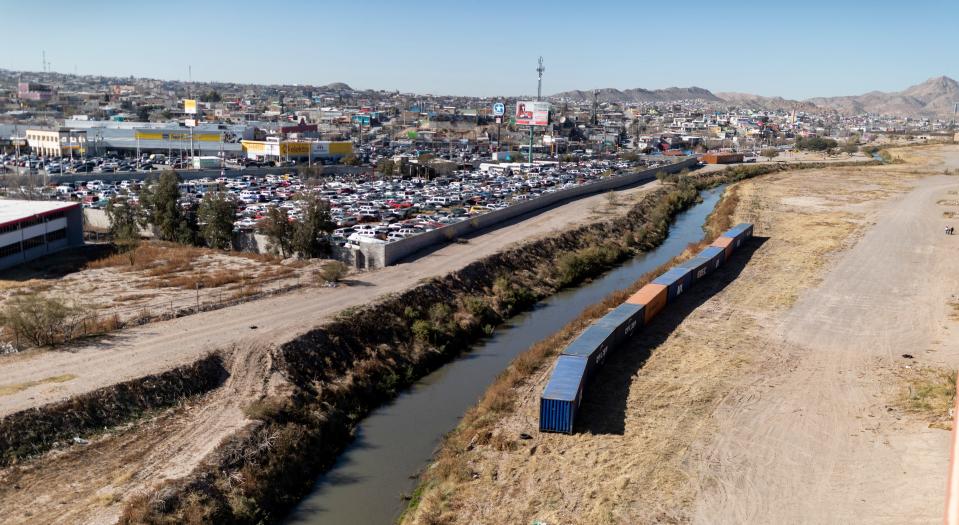Personal stories give Mercyhurst students new perspective on border situation
Early in January, I had the privilege of accompanying nine Mercyhurst University students on a "Border Witness" experience in the Rio Grande Valley in and around McAllen, Texas. Before we left, I asked the students what they hoped to learn. Their unanimous response was that they wanted to get beneath the veneer of hyperpoliticized rhetoric and reports that fill their social media feeds to truly see what is happening at the border. Many of these students major in intelligence studies, and they are well trained in skills for deciphering legitimate information.
On our trip we all learned the basic truth that no information is quite as valuable and truthful as authentic personal stories. It was inspiring to watch these bright, compassionate students, who typically learn from experts with doctorates, learn hard and fundamental truths from wise and generous women, many of whom were lucky to even complete high school.
The situation at the U.S.-Mexico border is often framed as a "crisis" or an "invasion," accompanied by isolated stories of people attempting to cross the border for nefarious purposes. While there is no denying the dire consequences of some of these border crossings, this is a humanitarian issue first and foremost.
Our experience was facilitated by ARISE Adelante, a ministry co-sponsored by the Sisters of Mercy and the Sisters Of Charity of the Incarnate Word. We were deeply impressed and humbled by the hospitality, honesty, and faith of the many women we met at the various ARISE community centers, who shared their stories with great vulnerability and courage.
More:Rescues of asylum-seekers soar as Border Patrol ramps up efforts and more migrants arrive
Sister Michele Schroeck, RSM, a vocation minister for the Sisters of Mercy of the Americas, accompanied our group and shared that "their testimonies and those of the women we met during home visits in the colonias near McAllen, Texas, gave voice and life to the realities and border issues that we learned about from various speakers."
Most of their stories involve abuse and trauma, especially when they lived in Mexico. Some of these women have been living in the U.S. for decades, paying taxes and meaningfully contributing to their communities. Many have never and will never have health care and they enjoy very few legal protections. Yet, most are deeply grateful for the relative security they have enjoyed in the U.S. and are most proud of their children, many of whom have gone to college and are engaged in successful careers.

During several days we had intensive exposure to various aspects of the situation at the border — the border wall, community centers where basic services are offered to migrant families, anti-human trafficking efforts, legal aid agencies, workers' rights collaborations, and respite and emergency shelters for those who have entered the official legal process for seeking asylum. The challenges at the border are overwhelming and complex, and all involve human beings facing tremendous adversity.
Students like sophomore Gina Sarama observed that no political party can claim to have solved the most pressing challenges at the border. Speaking with various experts made it clear that our current and former U.S. presidents and their administrations (from both parties) have failed to figure out effective and humane policies for managing the ongoing stream of asylum seekers who come to the U.S. seeking basic human rights like food, shelter, and safety.
Allison Siegmann, a senior, noted that "There are few resources that the government offers to help migrants find security after getting to the United States if they even make it that far. I learned about the extreme difficulties it takes to make the journey across the border, and I hope that U.S. citizens can do their own research to understand these difficulties as well."
I spent much of the trip reflecting on stories we learned of Haitian families. Many are college-educated families who left quality jobs, happy lives, and the country they loved to seek safe living situations. They likely left Haiti as long ago as three years for Chile — where the regulations for those seeking asylum are lax — gradually making their way north. Their children had no formal education during this time. Many Haitians are now waiting in unsafe and under-resourced conditions in Mexico because of Title 42, a U.S. public health measure enacted amidst the COVID-19 pandemic. Title 42 has given government agencies extraordinary liberties to deport or to prevent asylum-seekers from attempting to enter the country legally.
We also met two amazing Sisters of Mercy, Sister Pat and Sister Terry, who cross the border to Mexico along with a couple of young priests each week to care for these families in waiting. On foot, they carry necessary supplies and food to people waiting in shelters on the Mexican side. Wherever there is desperate poverty, one can often find these examples of heroic goodness.
As we boarded our own flight to leave McAllen, we recognized a family at the airport with a sign, "I do not speak English. Please help." They were Haitian. Against many odds, this family had somehow made it to the U.S. They looked tired, yet they greeted me with extraordinarily kind smiles. We shared a few communications in English. I wished them a safe flight and God's blessings. They are resourceful and will be fine managing their flights. I wish I was as hopeful about their long road ahead navigating the current system for those seeking asylum in the U.S.
And now I am here in Erie, along with these students whose lives have been changed. We cannot and will not forget the people caught up in this messiness and the human goodness that we found everywhere along the border in Texas.
Greg Baker, D. Min., is vice president of mission at Mercyhurst University.
This article originally appeared on Erie Times-News: Journey to southern border gives Mercyhurst students new understanding

